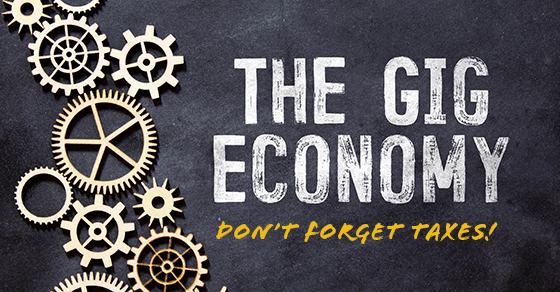The gig economy offers flexibility, independence, and unique income opportunities — but it also comes with unique tax responsibilities that often catch workers by surprise.
Whether you're delivering food, driving for a rideshare app, selling online, or offering services like tutoring or dog walking, it's essential to understand how gig work impacts your taxes so you can avoid unexpected costs and stay compliant.

Understanding your tax status
One of the biggest differences between traditional employment and gig work is your classification. Most gig workers are considered independent contractors, not employees. This means that companies you work with typically don’t withhold income taxes, Social Security, or Medicare taxes from your pay. Instead, you’re responsible for tracking and paying these taxes yourself.
As an independent contractor, your earnings are considered self-employment income. This status has specific tax consequences and responsibilities, including the need to file Schedule C (Profit or Loss from Business) with your tax return and pay self-employment tax using Schedule SE.
Self-employment tax explained
Self-employment tax covers Social Security and Medicare taxes for those who work for themselves. In 2025, the self-employment tax rate is 15.3% — 12.4% for Social Security and 2.9% for Medicare. If your net earnings exceed $400 for the year, you’re required to pay this tax, regardless of your age or whether you receive Social Security benefits.
It’s important to note that while this may seem steep, self-employed individuals can deduct half (the employer-equivalent portion) of the self-employment tax from their taxable income, which helps offset the burden.
Quarterly estimated tax payments
Because taxes aren’t automatically withheld from your gig income, you may need to make estimated tax payments to the IRS. These payments are due April 15, June 15, September 15 and January 15 of the following year. (If a due date falls on a Saturday, Sunday or holiday, the due date becomes the next business day.)
Failing to pay enough throughout the year could result in penalties and interest, even if you end up getting a refund at tax time. To avoid this, we can help you calculate your estimated tax payments based on your expected income, deductions and credits.
Recordkeeping and deductions
Maintaining accurate records is essential for gig workers. Keep track of all your income, whether you receive Form 1099-NEC from your customers or not. Many platforms only issue 1099s if you earn $600 or more from them, but all income must be reported, regardless of whether you get a form.
On the plus side, gig workers can deduct many business-related expenses to reduce their taxable income. Common deductions include eligible:
- Vehicle mileage and maintenance expenses,
- Home office expenses,
- Advertising and marketing expenses, and
- Professional services expenses, such as for tax or legal advice.
Make sure you keep receipts and records to substantiate these deductions in case of an IRS audit.
State and local taxes
Don’t forget about state and local taxes. Depending on where you live, you may owe income taxes to your state or city. Some states also have specific requirements for self-employed individuals, such as business licenses or local tax filings.
Tips for staying compliant
To stay on top of your tax responsibilities, here are four tips to consider:
- Set aside 25%–30% of your income for taxes.
- Use accounting software or spreadsheets to track income and expenses.
- File taxes on time, and don’t ignore IRS correspondence.
- Consult with us to help you navigate complex deductions and ensure accuracy.
Plan ahead for the best results
The freedom of gig work comes with added responsibility. By understanding your tax obligations, keeping good records, and planning for quarterly payments, you can avoid penalties and keep more of what you earn. Being proactive with your taxes helps ensure that your gig income remains both profitable and compliant. Contact your Rudler, PSC advisor at 859-331-1717 to help you handle your taxes so you can focus on your gig!
RUDLER, PSC CPAs and Business Advisors
This week's Rudler Review is presented by Austin Alwell, CPA and Heather Davis, CPA.
If you would like to discuss your particular situation, contact Austin or Heather at 859-331-1717.


As part of Rudler, PSC's commitment to true proactive client partnerships, we have encouraged our professionals to specialize in their areas of interest, providing clients with specialized knowledge and strategic relationships. Be sure to receive future Rudler Reviews for advice from our experts, sign up today !